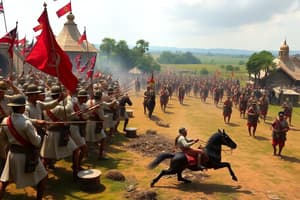Podcast
Questions and Answers
What are the far-reaching consequences of the Battle of Plassey?
What are the far-reaching consequences of the Battle of Plassey?
It shaped the future global balance of power.
When did the Battle of Plassey take place?
When did the Battle of Plassey take place?
June 23rd, 1757
Who led the British forces in the Battle of Plassey?
Who led the British forces in the Battle of Plassey?
Major General Robert Clive
What led to the Battle of Plassey?
What led to the Battle of Plassey?
What marked the decline of the Mughal Empire in South Asia?
What marked the decline of the Mughal Empire in South Asia?
What were some consequences of the Battle of Plassey for Bengali peasants?
What were some consequences of the Battle of Plassey for Bengali peasants?
Who laid siege to Fort William before the Battle of Plassey?
Who laid siege to Fort William before the Battle of Plassey?
How did the British victory in the Battle of Plassey impact their control over India?
How did the British victory in the Battle of Plassey impact their control over India?
What role did Raja Singh play in the Battle of Plassey?
What role did Raja Singh play in the Battle of Plassey?
How did Robert Clive's victory at Plassey impact his political career?
How did Robert Clive's victory at Plassey impact his political career?
What were some broader geopolitical ramifications of the Battle of Plassey?
What were some broader geopolitical ramifications of the Battle of Plassey?
What combination of tactics did Clive use to secure victory at Plassey?
What combination of tactics did Clive use to secure victory at Plassey?
Flashcards
Battle of Plassey
Battle of Plassey
The Battle of Plassey, fought on June 23, 1757, between the British East India Company (BEIC) led by Robert Clive and the Bengal Nawab Siraj ud-Daulah, marked a turning point in British colonial expansion in India.
Decline of Mughal Empire
Decline of Mughal Empire
The Mughal Empire, once a powerful force in South Asia, began to decline after the death of its ruler in 1717, leaving a power vacuum that the British East India Company sought to exploit.
British East India Company (BEIC)
British East India Company (BEIC)
The British East India Company (BEIC) was a trading company chartered by the British crown that had established a significant presence in Calcutta before the battle.
Siraj ud-Daulah
Siraj ud-Daulah
Signup and view all the flashcards
Siege of Fort William
Siege of Fort William
Signup and view all the flashcards
Robert Clive
Robert Clive
Signup and view all the flashcards
Tactics at Plassey
Tactics at Plassey
Signup and view all the flashcards
BEIC Control of Bengal
BEIC Control of Bengal
Signup and view all the flashcards
Exploitation of Bengal
Exploitation of Bengal
Signup and view all the flashcards
Significance of Plassey
Significance of Plassey
Signup and view all the flashcards
British Victory at Plassey
British Victory at Plassey
Signup and view all the flashcards
Turning Point in India's History
Turning Point in India's History
Signup and view all the flashcards
Study Notes
Battle of Plassey
The Battle of Plassey was fought between British forces led by Major General Robert Clive and Indian troops under Bengal Nawab Siraj ud Daulah near Murshidabad city in present-day West Bengal, India, on June 23rd, 1757. It is considered one of the most significant battles in world history due to its far-reaching consequences, which would shape the future global balance of power.
Background
Before the battle, the region of Bengal, Bihar, and Orissa had been ruled by Mughal emperors until 1717 when the subcontinent's ruler died without male heirs. This event marked the beginning of the decline of the Mughal Empire in South Asia. By early 1756, the British East India Company (BEIC) was well established in Calcutta; however, they were threatened by Siraj ud Daulah, who wanted them out of Bengal. In May 1756, Daulah laid siege to Fort William and captured it after several months of resistance from the British garrison. Many historians believe this defeat was the catalyst for the Battle of Plassey.
Robert Clive gathered a small group of British soldiers with some local Indian allies and marched towards Patna to relieve the besieged English factory there. On his return journey, Clive met with Siraj ud Daulah, whom he felt was treating him unjustly. He plotted revenge against the nawab, eventually leading up to the confrontation at Palashi.
The Battle
On the day of the battle, Clive deployed only around 3,000 men—half the size of Siraj ud Daulah's force. Despite these odds, Clive managed to secure victory by using a combination of strategic planning and deception tactics. One notable aspect of the battle involved the use of the allegiance of Raja Singh, a local landowner and enemy of Siraj ud Daulah, whose troops helped turn the tide during the crucial moment of the conflict.
Aftermath and Ramifications
After securing his position as the leader of Bengal, Robert Clive returned to England in 1759 where he became the youngest man ever elected to the House of Commons. Meanwhile, Bengali peasants suffered greatly because of the new taxes imposed upon them by the BEIC, resulting in widespread famine and disease. Furthermore, following their victory, the British gained control over much of eastern India, setting the stage for further expansion into broader territories across the continent.
In summary, the Battle of Plassey had profound effects both within the immediate context of British colonialism and beyond, shaping global geopolitical dynamics throughout subsequent centuries.
Studying That Suits You
Use AI to generate personalized quizzes and flashcards to suit your learning preferences.




